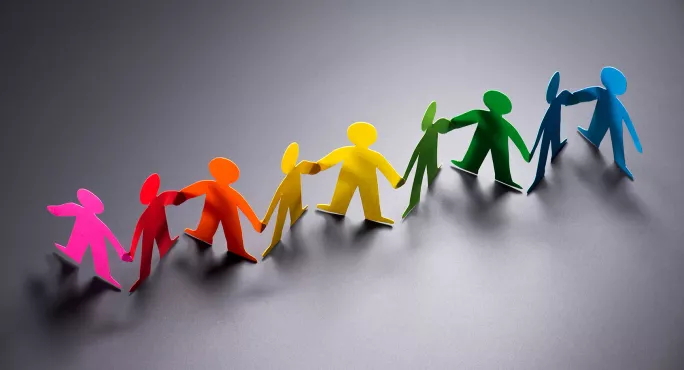Call for LGBT+ lessons in primary or early years

Nearly three-quarters of LGBT+ young adults believe pupils should learn about LGBT+ inclusion in primary school or nursery, according to research out today.
And in a survey of 3,695 adults aged 18 to 25, carried out by LGBT+ young people’s charity Just Like Us, more than a third (37 per cent) of non-LGBT+ young adults said LGBT+-inclusive education should start in primary school or nursery.
Some 44 per cent of LGBT+ respondents believe children should learn about LGBT+ identities in primary school, and 30 per cent said they should learn about the topic before this.
- Exclusive: Faith is a barrier to discussing LGBT+ issues, say teachers
- Related: Just one in 10 LGBT+ young people rate school experience “good”
- Safeguarding: Teachers urged to better protect LGBT+ students
This compared with 28 per cent of non-LGBT+ respondents who think LGBT+ identities should be taught about in primary school, and 9 per cent of non-LGBT+ young adults who think LGBT+ identities should be discussed in pre-school or earlier.
Some 18 per cent of non-LGBT+ young adults said they thought children should never learn about LGBT+ people in primary or secondary school.
Of all LGBT+ identities, non-binary young adults were the most likely (47 per cent) to say that children should learn about LGBT+ identities in pre-school or earlier. The least likely to say so were gay men and those still questioning their LGBT+ identity (both 19 per cent).
Starting LGBT+ education earlier
Amy Ashenden, interim chief executive of Just Like Us, said: “It is unsurprising that LGBT+ young people wish inclusive education began earlier, as silence leads to shame and stigma.
“Our School Diversity Week programme with primary schools is simply about kindness, respecting difference and celebrating diverse families - for example, talking about how some people have lesbian mums, two dads or a trans sibling, which is reality for many young people in school today.
“Our previous research has shown that positive LGBT+ messaging in schools is linked to young people - whether they’re LGBT+ or not - being less likely to contemplate suicide and feeling safer at school, so it’s vital that all schools are LGBT+-inclusive for the sake of wellbeing.”
Last month teachers’ leaders complained that schools are “caught in the crossfire” on issues around gender and identity education, and accused the government of dragging its feet on issuing new guidance.
Prime minister Rishi Sunak promised guidance “within weeks” last month but this has yet to be published.
Current government guidance on relationships education and relationships and sex education states that schools should ensure that the needs of all pupils are appropriately met, and that all pupils understand the importance of equality and respect.
Schools must make sure that they comply with the relevant provisions of the Equality Act 2010, under which sexual orientation and gender reassignment are among the protected characteristics.
The current guidance adds that schools should ensure that all of their teaching is sensitive and age-appropriate in approach and content.
It adds: “At the point at which schools consider it appropriate to teach their pupils about LGBT, they should ensure that this content is fully integrated into their programmes of study for this area of the curriculum rather than delivered as a standalone unit or lesson.
“Schools are free to determine how they do this, and we expect all pupils to have been taught LGBT content at a timely point as part of this area of the curriculum.”
In primary schools, the government says, teaching about families requires “sensitive and well-judged teaching” based on knowledge of pupils and their circumstances.
The poll data published today will be used in a new report by Just Like Us called Positive Futures, due to be published in June.
Just Like Us’ research was carried out independently by Cibyl in January 2023. It included responses from 1,736 LGBT+ young adults.
Protest controversy
The teaching of awareness of LGBT+ in primary schools was the source of controversy in 2019 with a series of protests held outside schools in the West Midlands.
This culminated in anti-LGBT equality teaching protests being permanently banned outside Anderton Park Primary, in Birmingham, after it endured weeks of noisy disruption.
During the controversy, the headteacher of the school, Sarah Hewitt-Clarkson, had raised concerns about information on the Department for Education website
A “frequently asked questions” section about the DfE’s plans for compulsory relationships education had previously said there was “no specific requirement” for primary schools to teach LGBT content.
Ms Hewitt-Clarkson told heads at the NAHT annual conference of that year that this was at odds with the government’s relationships education policy and was helping to fuel protests.
Compulsory relationships education was introduced in September 2020.
The government’s frequently asked questions page on this subject, which was last updated in 2020, says that “primary schools are strongly encouraged and enabled to cover LGBT content when teaching about different types of families” and that “secondary schools should cover LGBT content in their RSE teaching.”
The DfE has been approached for comment.
You need a Tes subscription to read this article
Subscribe now to read this article and get other subscriber-only content:
- Unlimited access to all Tes magazine content
- Exclusive subscriber-only stories
- Award-winning email newsletters
Already a subscriber? Log in
You need a subscription to read this article
Subscribe now to read this article and get other subscriber-only content, including:
- Unlimited access to all Tes magazine content
- Exclusive subscriber-only stories
- Award-winning email newsletters
topics in this article



